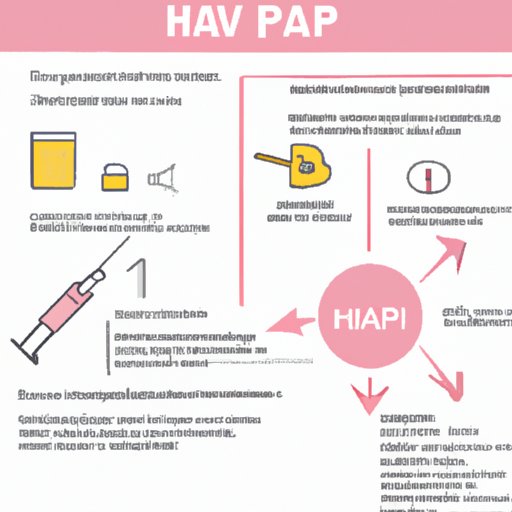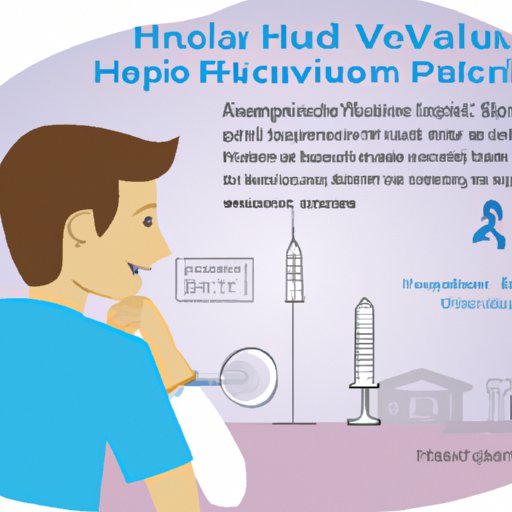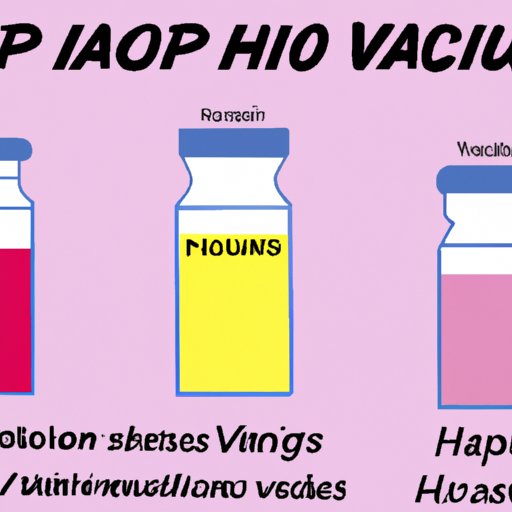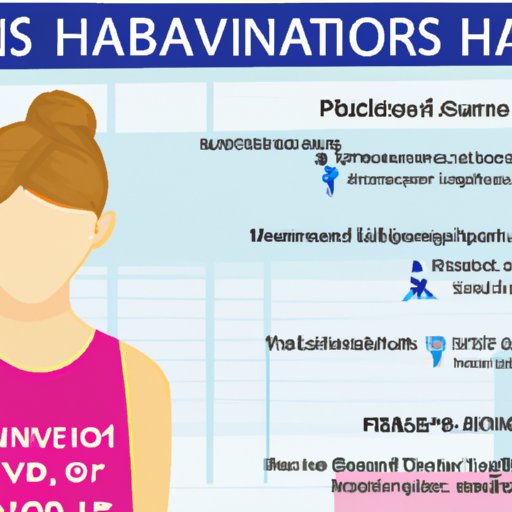
I. An Overview of HPV and How the Vaccine Works
Human papillomavirus (HPV) is a common virus that can cause a variety of diseases in humans, including genital warts, cervical cancer, and other types of cancers. The HPV vaccine is a safe and effective way to prevent infection with certain types of HPV and reduce the risk of developing HPV-related diseases. In this article, we will explore how the HPV vaccine works, examine the benefits and risks associated with it, and look at the different types of HPV vaccines available.
A. What is HPV?
HPV is a group of more than 150 related viruses that can spread through sexual contact. Most types of HPV are harmless and cause no symptoms. However, some types of HPV can cause genital warts or certain types of cancer, such as cervical cancer. HPV is the most common sexually transmitted infection (STI) in the United States and affects both men and women.
B. How does the HPV Vaccine Work?
The HPV vaccine works by triggering the body’s immune system to produce antibodies that can protect against infection with certain types of HPV. The vaccine contains weakened or inactive forms of the virus, which stimulate the body to develop immunity against HPV. The body then produces specific antibodies that help fight off any future infection with the same type of HPV.
II. Exploring the Mechanism Behind HPV Vaccination
A. What are Antigens?
Antigens are molecules that are found on the surface of cells and viruses. They act as markers that identify the cell or virus as foreign and trigger the body’s immune system to produce antibodies that can fight off the infection. When the body is exposed to an antigen, it produces specific antibodies that are specific to that particular antigen.
B. How do Antigens Help in Protecting Against HPV?
When the body is exposed to the antigens in the HPV vaccine, it produces antibodies that are specific to those antigens. These antibodies bind to the surface of the HPV virus, preventing it from entering cells and causing infection. As a result, the body is protected from infection with the types of HPV that are included in the vaccine.
C. How do Vaccines Help Strengthen Immunity Against HPV?
By exposing the body to antigens in the HPV vaccine, the body is able to build up immunity against the virus. This means that if the body is ever exposed to the same type of HPV again, the antibodies produced in response to the vaccine will be able to fight off the infection before it has a chance to cause disease.

III. Examining the Benefits of HPV Vaccination
A. What are the Advantages of HPV Vaccination?
HPV vaccination can prevent infection with certain types of HPV, which can reduce the risk of developing HPV-related diseases, including genital warts and certain types of cancer. Vaccination can also reduce the risk of passing HPV to others. In addition, HPV vaccination can reduce the number of abnormal Pap tests and the need for follow-up treatments.
B. Who Should Get the HPV Vaccine?
The HPV vaccine is recommended for adolescents and young adults aged 11 to 26. It is most effective when given before a person is exposed to the virus, so it is important to get vaccinated before becoming sexually active.
IV. Understanding the Side Effects of HPV Vaccination
A. What are the Common Side Effects of HPV Vaccination?
The most common side effects of the HPV vaccine are mild and include pain, redness, and swelling at the injection site. Other common side effects may include headache, nausea, fever, and fatigue. These side effects are usually mild and go away on their own within a few days.
B. Are There any Long-Term Health Risks Associated with HPV Vaccination?
There have been no long-term health risks associated with HPV vaccination. The safety of the HPV vaccine has been extensively studied and monitored, and there is no evidence that it poses any long-term health risks.
V. What to Know Before Getting HPV Vaccinated
A. What Questions Should I Ask Before Getting HPV Vaccinated?
Before getting the HPV vaccine, you should talk to your doctor about any questions or concerns you may have. Your doctor can provide more information about the benefits and risks of the vaccine, and answer any questions you may have about the vaccine.
B. How Can I Prepare for Getting HPV Vaccinated?
Before getting the HPV vaccine, you should make sure you are up to date on all other recommended vaccines, including tetanus, diphtheria, and pertussis (Tdap). You should also make sure to tell your doctor about any allergies or medical conditions you may have. Finally, it is important to follow the schedule provided by your doctor for getting the vaccine.

VI. A Look at the Different Types of HPV Vaccines
A. What are the Different HPV Vaccines Available?
There are currently two types of HPV vaccines available: Gardasil 9 and Cervarix. Gardasil 9 protects against nine types of HPV, while Cervarix protects against two types of HPV. Both vaccines are highly effective in preventing infection with the types of HPV they target.
B. How Do the Different HPV Vaccines Differ?
The main difference between Gardasil 9 and Cervarix is the number of types of HPV they protect against. Gardasil 9 protects against nine types of HPV, while Cervarix protects against two types of HPV. Additionally, Gardasil 9 is also approved for use in males, while Cervarix is only approved for use in females.

VII. Exploring the Controversies Surrounding HPV Vaccination
A. What are Some of the Common Concerns About HPV Vaccination?
There have been some concerns raised about the safety and effectiveness of the HPV vaccine. Some people are concerned that the vaccine could lead to an increase in risky behaviors, such as unprotected sex. Others are concerned that the vaccine could cause serious side effects. Finally, some people are concerned that the vaccine is not necessary and that it could lead to over-vaccination.
B. What is the Evidence Behind These Concerns?
The safety and effectiveness of the HPV vaccine have been extensively studied and monitored. Studies have shown that the HPV vaccine is safe and effective in preventing infection with certain types of HPV. Additionally, studies have not found any evidence that the vaccine leads to an increase in risky behaviors. Finally, studies have shown that the HPV vaccine is an important tool in reducing the incidence of HPV-related diseases.
Conclusion
The HPV vaccine is a safe and effective way to prevent infection with certain types of HPV and reduce the risk of developing HPV-related diseases. Although there have been some concerns raised about the safety and effectiveness of the vaccine, studies have shown that the HPV vaccine is safe and effective. It is important to talk to your doctor about any questions or concerns you may have before getting the HPV vaccine.
(Note: Is this article not meeting your expectations? Do you have knowledge or insights to share? Unlock new opportunities and expand your reach by joining our authors team. Click Registration to join us and share your expertise with our readers.)
